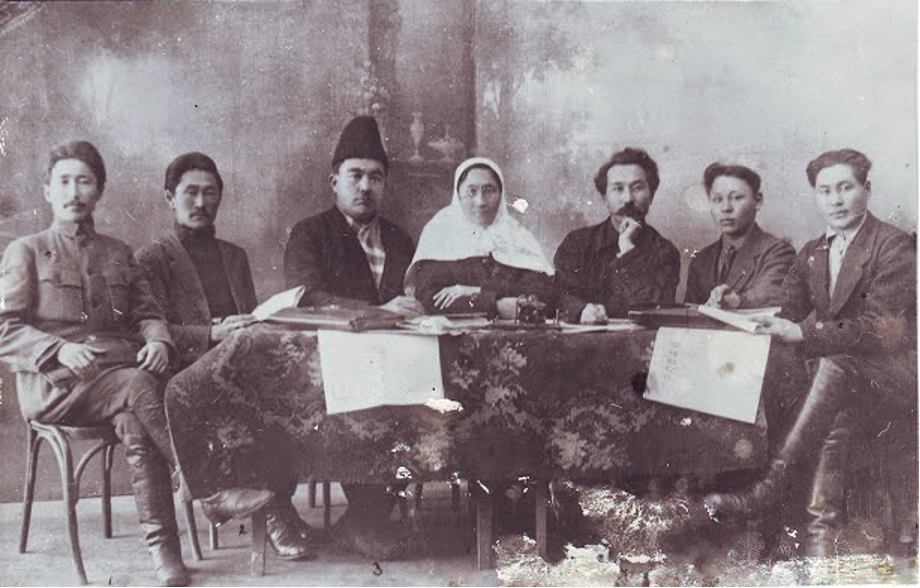
The editorial office of the newspaper "Enbekshi kazak".
The writer was born in Aktobe tract of Taranovsky district of Kostanay region on November 15, 1894. Even as a child, Beimbet lost his parents and grew up with his grandmother, who, despite her poverty, was able to educate the boy.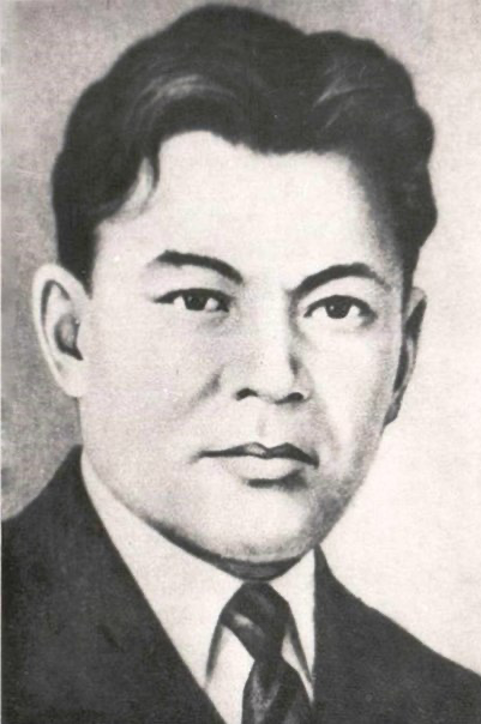
The main education was received by AUL mullah, who arrived in AUL Madrasah two years ago. "The emphasis is on his work in Trinity, in the school "" Uazifa"", the Russian-Kazakh school in Kustana, and the madrasa ""Gaul "" in Ufa." In 1916-1922, Beimbet Mylin worked in the field of teaching. The meeting with professional writers - Mukhamedzhan Seralin and a journalist, the poet Sultanmakhmut Toraigyrov, and also increased the desire of Beimbeta for literary work. In 1922-1923 GG. worked in the newspaper" Enbekshi Kazakh", published in Orenburg, 1923-1925 GG. - in the newspaper" Auyl " Kustanai province. In 1928-1932, he worked as a literary collaborator, editor of the newspaper "Kazakh Tili", in 1932-1934 — a working wife, editor of the newspaper "Socialist Kazakhstan", in 1934-1937 — editor of the newspaper "Kazakh literature".
Beimbet Mailin's creative path began with the creation of poetic works — the first poem published in the periodical press was "Dumy" (Aykap magazine, 1914, No. 12). In the poems "Traits of a Muslim", "Need", "Cattle", "Wealth", "Summer Evening", Mailin described his thoughts about life, injustice, and the hard lot of the people.
(1912-1915)
The poem "Bloody Fog" is dedicated to the events of the national liberation uprising of 1916. Pinning his hopes on the February Revolution, he wrote poems "In the steppe", "Kazakh".
The hero of many of Mailin's poems, poems, and short stories is in the past a downtrodden poor man who became the builder of a new life, for example, the hero of his lyrics Myrkymbai in the poems "Myrkymbai", "The Annoyance of the poor man", "Give me your hand, Myrkymbai", "Hey, Myrkymbai" and others. The fundamental changes in the life of the steppe, the collective farm village, collectivization are reflected in the poems "The New Song of the village", "The Song of the collective", "The Day has Come", "The Awakened Steppe" (1922-1930).
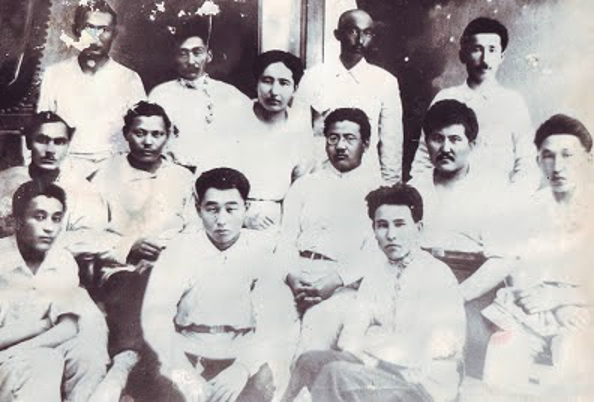
B.Mailin with young Kazakh writers
Beimbet Mailin is the author of more than ten poems. The first collection of Mailin's poems was published in 1936 under the title "Marzhan". Among the poems written: "Bayskaya daughter", "Razia Girl", "Runaway", "Marzhan", dedicated to the tragic fate of a Kazakh girl in a pre-revolutionary village, "Kanai", "Sagyndyk", "The Old Woman's Tale", describing the Civil War and the establishment of Soviet power in Kazakhstan. (1920-1936)
Mailin also made a great contribution to the development of the prose genre in Kazakhstan, especially the short story. His first story "The Past" was published in the magazine "Aykap" (1915, No. 10). Among the stories written: "Eighty rubles", "Equality of the poor man", "Ayranbai", "Bulany pacer", "Justified labor", "Red striped fur coat", "Letter of Shapai", "Chairman of the Kamil collective farm", "Black bucket", "Ulbosyn", "Mukysh, son of Arystanbai" and others.
The writer is also known as a talented essayist and feuilletonist. In the collection of essays "On the construction sites of giants" (1934), he reflected the stressful life of Soviet people during the years of industrialization, in the collection of feuilletons "Clippings" (1924), he struggled with remnants of the past in people's minds.
The most famous of all his works is his first novel "The Monument of Shugi", written in 1915, revised and published in 1922. In it, Mailin realistically described the fate of a Kazakh girl forced to obey customs. Later, in his novels, Mailin repeatedly returned to the problem of women's equality (the stories "The Communist Raushan" of 1923, "Beren" of 1935). In 1933, the writer wrote novels - "The Story of Amirzhan", "Fifteen Yards", "On the Current", which describes the struggle for the establishment of Soviet power in Kazakhstan, collective farm construction.
ішінде ең танымалы1915 жылы жазылған, қайта қаралып, 1922 жылы шыққан «Шұғаның белгісі» алғашқы әңгімесі. Онда Майлин әдет-ғұрыпқа бағынуға мәжбүр болған қазақ қызының тағдырын шынайы сипаттады. Болашақта Майлин өзінің әңгімелерінде әйел теңдігі мәселесіне бірнеше рет оралды (1923 жылғы «Коммунист Раушан», 1935 жылғы «Берен» повестері). 1933 жылы жазушы «Әміржанның ертегісі», «Он бес ауыл» повестерін жазады, онда Қазақстанда Кеңес өкіметін орнату үшін күрес, колхоз құрылысы сипатталған.
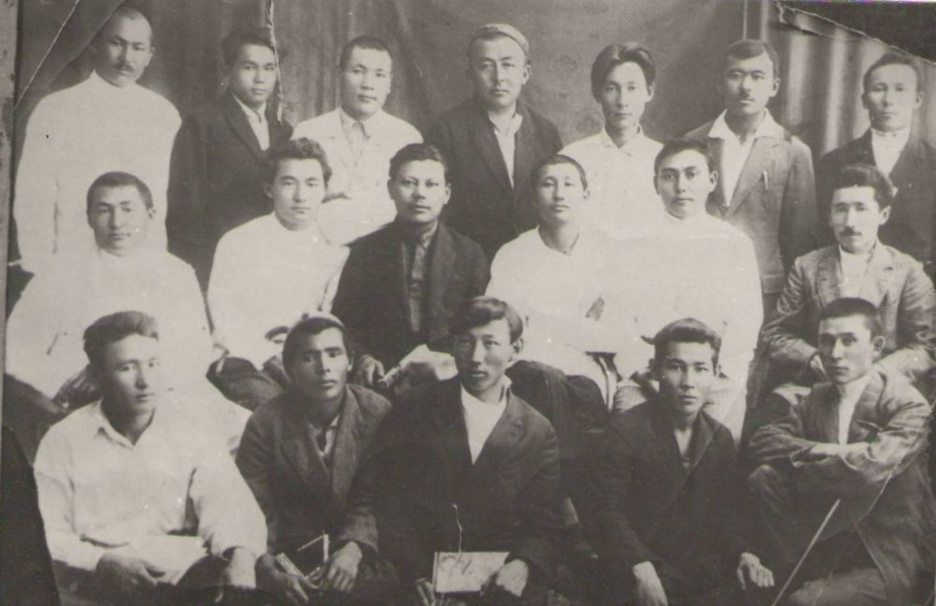
The photo shows public figures of Kazakhstan in the 30s of the XX century - Beimbet Mailin (fourth from left in the second row), Ilyas Dzhansugurov, Saken Seifullin, Sabit Mukanov, Zhakan Syzdykov, Abdilda Tazhibayev, etc.
Changes in the political system in the steppe are also shown in the novel "Azamat Azamatovich" (1935), which was the first part of the conceived trilogy, in 1935 the novel was translated into Russian under the title "Daughter of the Kazakh". Other novels of Mailin ("Red Flag", "Neighbors", "Fight") have not been preserved, excerpts from them were published in the magazine "Adebiet Maidany" in 1932-1936.
Mailin also made a great contribution to the development and development of various genres of drama in Kazakhstan, (1916-1936) he wrote the plays "Mullah Shanshar" "Betrothal" Protocol"Amangeldy, (together with G. Musrepov), "Taltanbai Orders", "Front", "Daughter-in-law and mother-in-law", "Zhalbyr", "Our horsemen" and others.
The writer's life and career were tragically cut short. In 1937, he was arrested on charges of counterrevolutionary, bourgeois-nationalist, insurgent-terrorist activities and, according to the definition of the military board of the Supreme Court of the USSR dated February 26, Beimbet Mailin was sentenced to death with immediate execution. / After the execution of the writer, his wife Kulzhamal was arrested and sent to the camp, even before that, all her children were taken away from her one by one and taken to orphanages. After her release in 1946, she searched for children for a long time. But only four were returned. /
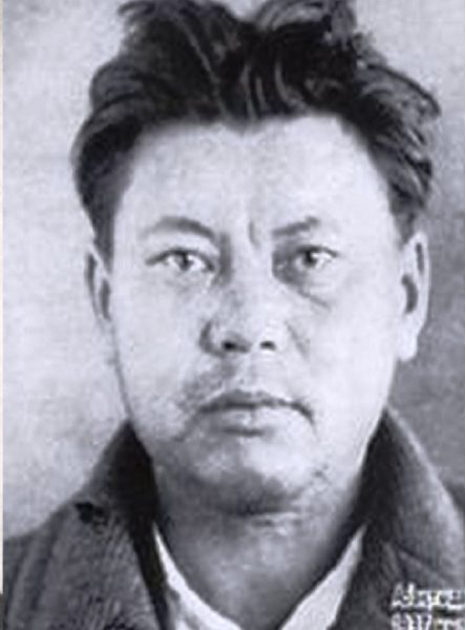
The last photo of the writer from the NKVD archive
Only in 1957, by a ruling of the Supreme Court of the USSR dated April 16, Beimbet Mailin was rehabilitated, the sentence was overturned and the case was dismissed for lack of corpus delicti.
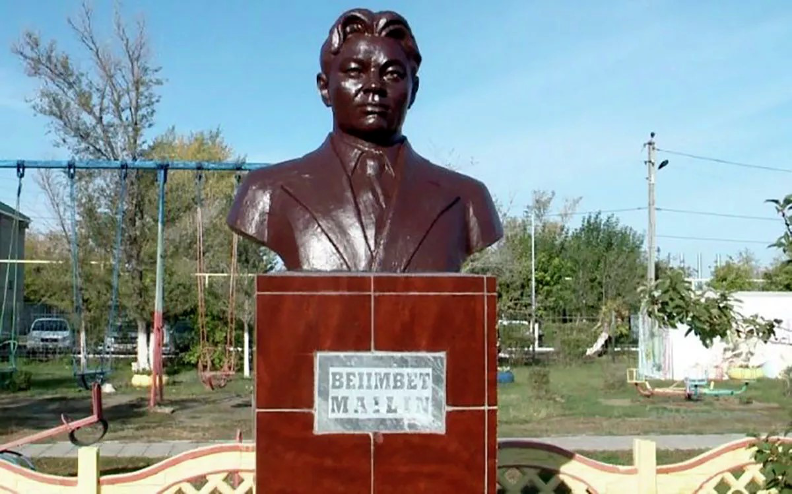
He was named after the village, the gymnasium in Taran district, Kostanay Street. A monument to B. Mailin was erected near the railway station of the Regional Center, a memorial plaque was opened in the editorial office of the newspaper "Kostanay Dawn", a monument was erected in the writer's native village. The Union of writers of Kazakhstan awards the B. Mailin prize for achievements in the field of literature.
Materials used /biografia.kz / and photos are taken from open sources, from the Taran Museum of local lore named after B. Mailin.









